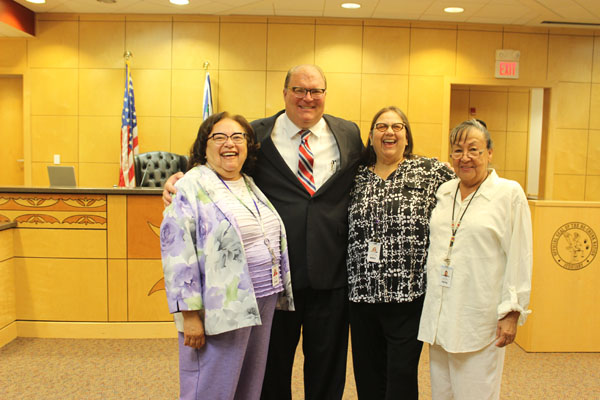Supreme Court Justice looks at success of court transfer process
By Ken Luchterhand

Wisconsin Supreme Court Justice Mike Gableman made an appearance to the Ho-Chunk Nation Tribal Court on June 9.
The Chief Justice appointed him to be the liaison between the Wisconsin State Court system and the tribal courts. Also present was Chief Judge Eugene White-Fish of the Forest County Potawatomi.
“I’m visiting all the tribes in the state,” Gableman said. “My first purpose is to become familiar with the people who run the administration – the staff and participants – in the court system so I can gain familiarity with the process each of the tribal courts use.”
He would then report back to his colleagues, based on surprised and warm welcomes, he said.
“It’s been a long time, if ever, that a Supreme Court justice has met with each tribal court,” Gableman said. “It’s special timing. On June 24, our court has a scheduled vote for voluntary transfer of jurisdiction renewed. It permits transferring jurisdiction in court cases from county circuit courts to tribal courts.
When he visited the Ho-Chunk Tribal Court, he had been to over half of the tribal courts in the state.
“By the end of next week, I plan to have visited all but one,” he said.
Conversations are being conducted about how the transfer of jurisdiction has been working. He plans to collect the data of the procedures thus far.
“I will find out how many times it has been done and in what types of cases it has been requested,” he said. “I’m finding that very few cases have been transferred. It seems to be working well.”
Conversations are ongoing and imperfections will be worked out, he said.
There is a system in which the transfer can be reversed, called the Teague Protocol. It happens when a judges of the tribal and circuit court meet and discuss the best of factors to consider if the case should be in either court.
Gableman sees that changing courts happens most frequently in higher population areas, such as with the Oneida in the Green Bay area and with Potawatomi in Forrest County. In those two areas, transfers are made on a regular basis.
The cases transferred are usually involving children, such as child custody cases.
“When it involves tribal members and child custody, they are more comfortable in tribal courts,” he said.
Another time when tribal courts are preferable is when the case involve drug court, when cultural influences may play a role.
“Paramount is the best interests of the children,” Gableman said. “It’s a better location for the best needs of the children.”
There’s a strong dedication to do the right thing, he said.
“What unites us in challenges far outweigh the differences,” Gableman said.
Home